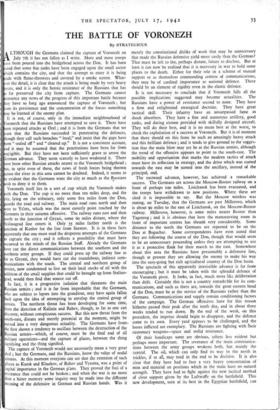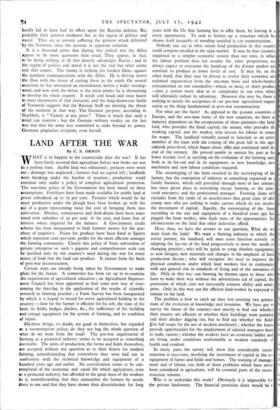THE BATTLE OF VORONEZH
By STRATEGICUS
LTHOUGH the Germans claimed the capture of Voronezh on July 7th it has not fallen as I write. More and more troops ave been poured into the bridgehead across the Don. It has been tared that some 800 tanks have been engaged upon the small sector thich contains the city, and that the attempt to enter it is being ade with flame-throwers and covered by a smoke screen. What- ver the detail, it is clear that the attack is being made by very heavy • ices, and it is only the heroic resistance of the Russians that has
far preserved the city from capture. The Germans cannot nnounce any news of the progress of this important battle because ey have so long ago announced the capture of Voronezh ; but om its persistence and the concentration of the forces something • ay be learned of the enemy plan.
It is not, of course, only in the immediate neighbourhood of oronezh that the Russians have attempted to save it. There have • een repeated attacks at Orel ; and it is from the Germans that we earn that the Russians succeeded in penetrating the defences, ough they call such breaches "local," and insist that the gaps have • en "sealed off" and "cleared up." It is not a consistent account, nd it may be assumed that the penetrations have been far from egligible. But they have not been sufficiently grave to arrest the erman advance. They seem scarcely to have weakened it. There ave been other Russian attacks nearer to the Voronezh bridgehead ;
• ut, in spite even of these, the news of fresh forces being thrown cross the river in this area cannot be doubted. Indeed, it seems to
evident that the Germans want the city as much as the Russians sh to deny it to them.
Voronezh itself lies in a sort of cup which the Voronezh makes ith the Don. The cup is no more than ten miles deep, and the ty, lying on the tributary, only some five miles from the Don, uards the road and railway. The main road runs north and then est to Yelets, which was the most easterly point reached by the ermans in their autumn offensive. The railway runs east and then oath to the junction of Gryazi, some 6o miles distant, where the talinograd line enters it. Only 35 miles farther north is the unction of Kozlov for the line from Saratov. It is in these facts pparently that one must read the desperate attempts of the Germans o capture the city ; and it reflects a possibility that must have • curred to the minds of the Russian Staff. Already the Germans ave cut the direct communications between the southern and the orthem army groups. If they could press up the railway line as at as Gryazi, they would have cut the roundabout, indirect com- unications with the south. The central and northern group of rmies, now condemned to live on their local stocks of oil with the ddition of the small supplies that could be brought up from Stalino- ad, would then find that source cut off.
In fact, it is a progressive isolation that threatens the main • ussian armies ; and it is far from improbable that the Germans, ho are subject to lapses into the grandiose, may have again fallen • ack upon the idea of attempting to envelop the central group of nnies. The northern threat has been developing for some time, rom the direction of Kalinin and Rzhev, though, as far as one can • scover, without conspicuous success. But this new threat from the th-east, distant and merely potential at the moment, might be ursed into a very dangerous actuality. The Germans have from. e first shown a tendency to oscillate between the destruction of the ssian armies—which, of course, must be the final end of all • itary operations—and the capture of places, between the thing ignifying and the thing signified.
The capture of Voronezh would not necessarily mean a very great eat ; but the Germans, and the Russians, know the value of nodal centres. At this moment everyone can see that the retention of such places as Kursk and Kharkov, of Rzhev and Vyasma, was a point of pital importance in the German plans. They proved the foci of a esistance that could not be broken ; and when the war is no more • n a bitter memory some inquiry may be made into the different caning of the defensive in German and Russian hands. Was it
merely the constitutional dislike of work that may be unnecessary that made the Russian defensive yield more easily than the German? That must be left to the, perhaps distant, future to disclose_ But at least it can now be realised that it is necessary in war to hold some places to the death. Either for their role in a scheme of mutual support or as themselves commanding centres of communications, they may be of cardinal importance to national defence. There should be an element of rigidity even in the elastic defence.
It is not necessary to conclude that if Voronezh falls all the possible implications suggested may become actualities. The Russians have a power of resistance second to none. They have a firm and enlightened strategical doctrine. They have great tactical skill. Their infantry have an unsurpassed fame as shock absorbers. They have a fine and numerous artillery, good tanks, and daring airmen provided with skilfully designed aircraft. They will do their best, and it is no mean best at the worst, to check the exploitation of a success at Voronezh. But it is of moment that there should on this front be such an amazingly heavy attack and this brilliant defence ; and it tends to give ground to the sugges- tion that the main blow may yet be at the Russian armies, although the trend of the offensive appears to point to the south-east. The mobility and opportunism that marks the modern tactics of attack must have its reflection in strategy, and the drive which was started towards the east may be turned into the ancillary, instead of the principal, end.
The eastward advance, however, has achieved a remarkable success. The Germans are across the Moscow-Rostov railway on a front of perhaps too miles. Lisichansk has been evacuated, and the troops have withdrawn to new positions. Where these are sited it is impossible to say. But the Moscow wireless was stating, on Tuesday, that the Germans are past Millerovo, which is about 90 miles to the east of Lisichansk, on the Moscow-Rostov railway. Millerovo, however, is some miles nearer Rostov than Tagenrog ; and it is obvious that here the manoeuvring room in front of important centres has shrunk very considerably. Some distance to the north the Germans are reported to be on the Don at Boguchar. Some correspondents have even stated that they are following the course of the Don, though that would seem to be an unnecessary proceeding unless they are attempting to use it as a protective flank for their march to the east. Somewhere about this area the Russians have presumably a defensive line, though at present they are allowing the enemy to make his way into the easy-going but rich agricultural country of the Don basin.
The spectacle of this apparently irresistible advance is far from encouraging ; but it must be taken with the splendid defence of the Voronezh pivot. It looks, in fact, much more like deliberation than drift. Certainly this is not a country remarkable for its com- munications, and such as there are, towards the great eastern bend of the Don, must be at the service of the Russians rather than the Germans. Communications and supply remain conditioning factors of the campaign. The German offensives have for this reason hitherto passed their peak after the tenth day, and in about three weeks tended to run down. By the end of the week, on this precedent, the impetus should begin to disappear, and the defence come to its own. Every yard appears to be challenged, and the losses inflicted are exemplary. The Russians are fighting with their customary weapons—space and stolid resistance.
Of their handicaps some are obvious, others less evident but perhaps more important. The severance of the main communica- tions between the army groups weakens both, but mainly the central. The oil, which can only find its way to the north in trickles, if at all, may tend in the end to be decisive. It is also clear that they have had to face a very heavy concentration of men and material on positions which in the main have no natural strength. They have had to fight against the new tactical method of close support given by the Luftwaffe on the battlefield. This new development, seen at its best in the Egyptian battlefield, can
' hardly fail to have had its effect upon the Russian defence. But ; probably their greatest weakness lies in the region of politics and moral. They are at present suffering the greatest attack delivered by the Germans since the autumn in apparent isolation.
It is a thousand pities that during this critical test the Allies appear to be more quiescent than usual. They appear, in fact, I to be doing nothing at all that directly advantages Russia ; and in the region of politics and moral it is not the real but what seems ' real that counts. The enemy is striking his hardest blows against the northern communications with the Allies. He is driving across the Don with the threat of cutting these in the south. On several !occasions he has attempted an encirclement within a wider envelop- ment, and now with the threat to the main armies he is threatening to envelop the whole country. It needs cool heads and stout hearts to meet movements of that character, and the long-drawn-out battle of Voronezh suggests that the Russian Staff are meeting the threat of the moment in that way. The German purpose, according to I Goebbels, is "Victory at any price." There is much that such a mind can contrive ; but the German military verdict on the last war was that the army was committed to tasks beyond its power. Germany plagiarises everyone, even herself.



























 Previous page
Previous page